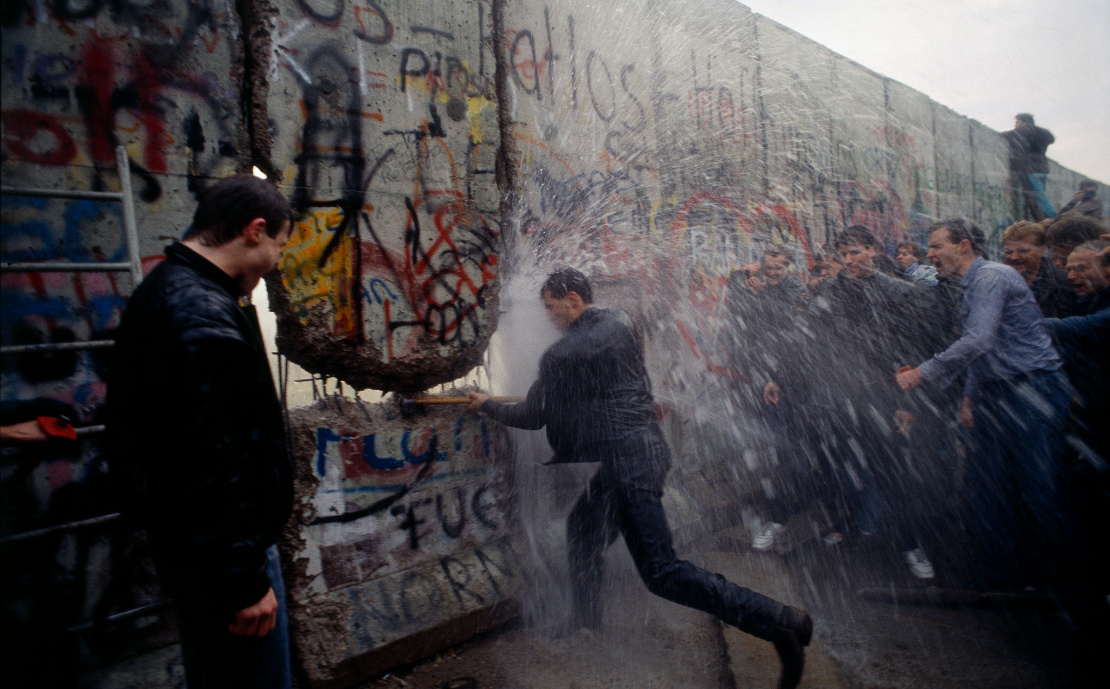Berlin Wall

Photo Credit: Anthony Suau, NY Times
Check Point Charlie, mine fields, machine guns, Berlin Wall
On the 20th Anniversary of the Fall of the Berlin Wall
November 9, 2009
I crossed through the Berlin Wall at Check Point Charlie several times in my late teens and early twenties. My sister and I visited Berlin in 1973 and I went again in 1977. There was no doubt of the seriousness of the Wall. There were serious looking soldiers with machine guns, serious looking barbed wire, very serious mine fields and a serious museum describing the deaths of those who tried to cross from the serious East to the edgy West. Berlin was an acutely serious and political city. For my travels in ’77, I had learned some German. I often ate at the university cafeterias in Europe because they were inexpensive. I ate at the University in West Berlin and noticed that in the bathrooms even the graffiti was serious and political. There was no smut, no for a good time call… but rather complaints about leaders and social situations.
During my first visit to East Berlin in 1973, I began taking photographs at Check Point Charlie. I was taking photographs of the East German soldiers and the signs stating that you are now crossing into East Berlin and the rules for crossing through the checkpoint when an American soldier approached me and told me that I could be shot by the East German guards for this violation of the rules. I was 19 and terrified and put away the camera, for a time.
I crossed into East Berlin on foot after changing a small amount of German marks into East German marks. These marks were not to be taken out of East Berlin. This ensured that each person who crossed into East Berlin would spend at least the $20 or $25 changed at the border. I did smuggle a few souvenir coins hidden in my pockets on my return to the West.
On my meanderings in East Berlin I could see in through a window to a small point shoe factory. As a dancer, I found this little factory fascinating. I say factory but it was really more of just a small gray room where a few people were making the beautiful pink shoes by hand - that pale pink loveliness of the shoes in stark contrast to the somber ubiquitous grayness of East Berlin. As I was getting my camera out of my bag the craftspeople saw me and immediately left the room. They were clearly afraid to have their photograph taken. I took the shots of the workshop and shoes but no people.
East Berlin was truly serious and somber, gray and gloomy. There was none of the nervous edgy overtly alluring hipness of West Berlin. But, in passing from West to East and back again, I felt an acute awareness of history and politics and life on a hair trigger. Our neighbor back in Virginia, Frank Korf, was a German who left Germany before the war and fought in WWII as an American soldier and later was part of the prosecution team at the Nuremberg trials. He told me about his adventures leaving Berlin as the walls were erected and closing. He recounted that he was the last American to leave as the wall closed behind him. He and his driver madly drove from the City so as not to be trapped before the walls closed. I envisioned this adventure as I visited Berlin.
When I left Berlin, I hitchhiked at the border. This was an easy place for hitchhikers because once a car passed through West Berlin, this tiny Western island in the middle of East Germany, the car was not permitted to stop until it reached the West German border. There were 2 highways out, one went west and one went southwest both straight to West Germany. I took the due West route and arrived back in West Germany and visited towns and villages with cuckoo clocks and town markets and majestic cathedrals. These towns were lovely and steeped in history but not the tangible tension of Berlin. West Berlin’s magnetism was wrought of pain and angst but it was very much alive.
It has been 42 years since I have been to Berlin and 20 years since the Wall was felled. I assume that Berlin has become very much like any other major Western city - relaxed, livable and humane and much less serious and edgy.
Want to Share This Story with Friends?
Berlin, Germany

To leave a comment, please Signin or Register.